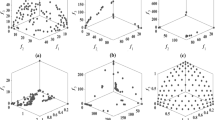Abstract
Particles in PSO algorithms evolve only in one group, or in many groups but without interaction between different groups. Inspired by the concept of social class evolution process, a hierarchical competition framework is proposed in this paper. Through the competition mechanism, particles can flow dynamically between different levels, and this can reduce the probability of top-level particles leading to a wrong direction and in this way enhance the global search ability. In this paper, the proposed framework is tested in combination with the canonical PSO and one of the most famous variant particle warm optimizers, named quantum-behaved particle swarm optimizer. All the experiments are run on the CEC’2013 benchmark function database, and the results show that the global search ability and the convergence speed are both improved compared to the basic optimizers.
Access this chapter
Tax calculation will be finalised at checkout
Purchases are for personal use only
Similar content being viewed by others
References
Bjorken, J.D., Drell, S.D.: Relativistic Quantum Mechanics. McGraw-Hill, New York (1965)
Clerc, M.: Stagnation analysis in particle swarm optimisation or what happens when nothing happens (2006)
Clerc, M., Kennedy, J.: The particle swarm-explosion, stability, and convergence in a multidimensional complex space. IEEE Trans. Evol. Comput. 6(1), 58–73 (2002)
Del Valle, Y., Venayagamoorthy, G.K., Mohagheghi, S., Hernandez, J.C., Harley, R.G.: Particle swarm optimization: basic concepts, variants and applications in power systems. IEEE Trans. Evol. Comput. 12(2), 171–195 (2008)
Fan, H.: Study on Vmax of particle swarm optimization. In: 2001 Proceedings of the Workshop on Particle Swarm Optimization (2001)
Fernandes, C.M., Rosa, A.C., Laredo, J.L., Cotta, C., Merelo, J.J.: A study on time-varying partially connected topologies for the particle swarm. In: 2013 IEEE Congress on Evolutionary Computation, pp. 2450–2456. IEEE (2013)
Figueiredo, E.M., Ludermir, T.B.: Effect of the PSO topologies on the performance of the PSO-ELM. In: 2012 Brazilian Symposium on Neural Networks, pp. 178–183. IEEE (2012)
Glerc, M.: Initialisations for particle swarm optimization (2008). http://clerc.maurice.free.fr/pso
Kennedy, J.: Small worlds and mega-minds: effects of neighborhood topology on particle swarm performance. In: Proceedings of the 1999 Congress on Evolutionary Computation-CEC99 (Cat. No. 99TH8406), vol. 3, pp. 1931–1938. IEEE (1999)
Kennedy, J.: Swarm intelligence. In: Zomaya, A.Y. (ed.) Handbook of Nature-Inspired and Innovative Computing, pp. 187–219. Springer, Boston (2006). https://doi.org/10.1007/0-387-27705-6_6
Kennedy, J., Mendes, R.: Population structure and particle swarm performance. In: Proceedings of the 2002 Congress on Evolutionary Computation. CEC’02 (Cat. No. 02TH8600), vol. 2, pp. 1671–1676. IEEE (2002)
Langdon, W.B., Poli, R.: Evolving problems to learn about particle swarm and other optimisers. In: 2005 IEEE Congress on Evolutionary Computation, vol. 1, pp. 81–88. IEEE (2005)
Li, X.: Niching without niching parameters: particle swarm optimization using a ring topology. IEEE Trans. Evol. Comput. 14(1), 150–169 (2010)
Liang, J., Qu, B., Suganthan, P., Hernández-Díaz, A.G.: Problem definitions and evaluation criteria for the cec 2013 special session on real-parameter optimization. Computational Intelligence Laboratory, Zhengzhou University, Zhengzhou, China and Nanyang Technological University, Singapore, Technical Report, vol. 201212, no. 34, pp. 281–295 (2013)
Ling, S.H., Iu, H.H.C., Leung, F.H.F., Chan, K.Y.: Improved hybrid particle swarm optimized wavelet neural network for modeling the development of fluid dispensing for electronic packaging. IEEE Trans. Industr. Electron. 55(9), 3447–3460 (2008)
Panda, A., Mallipeddi, R., Das, S.: Particle swarm optimization with a modified learning strategy and blending crossover. In: 2017 IEEE Symposium Series on Computational Intelligence (SSCI), pp. 1–8. IEEE (2017)
Richards, M., Ventura, D.: Choosing a starting configuration for particle swarm optimization. In: IEEE International Joint Conference on Neural Networks, vol. 3, pp. 2309–2312 (2004)
dos Santos Coelho, L., Herrera, B.M.: Fuzzy identification based on a chaotic particle swarm optimization approach applied to a nonlinear Yo-yo motion system. IEEE Trans. Industr. Electron. 54(6), 3234–3245 (2007)
Sun, J., Xu, W., Feng, B.: A global search strategy of quantum-behaved particle swarm optimization. In: 2004 IEEE Conference on Cybernetics and Intelligent Systems, vol. 1, pp. 111–116. IEEE (2004)
Author information
Authors and Affiliations
Corresponding author
Editor information
Editors and Affiliations
Rights and permissions
Copyright information
© 2019 Springer Nature Switzerland AG
About this paper
Cite this paper
Chen, Q., Sun, J., Palade, V., Li, C., Mao, Z., Wu, H. (2019). Hierarchical Competition Framework for Particle Swarm Optimization. In: Tan, Y., Shi, Y., Niu, B. (eds) Advances in Swarm Intelligence. ICSI 2019. Lecture Notes in Computer Science(), vol 11655. Springer, Cham. https://doi.org/10.1007/978-3-030-26369-0_15
Download citation
DOI: https://doi.org/10.1007/978-3-030-26369-0_15
Published:
Publisher Name: Springer, Cham
Print ISBN: 978-3-030-26368-3
Online ISBN: 978-3-030-26369-0
eBook Packages: Computer ScienceComputer Science (R0)




